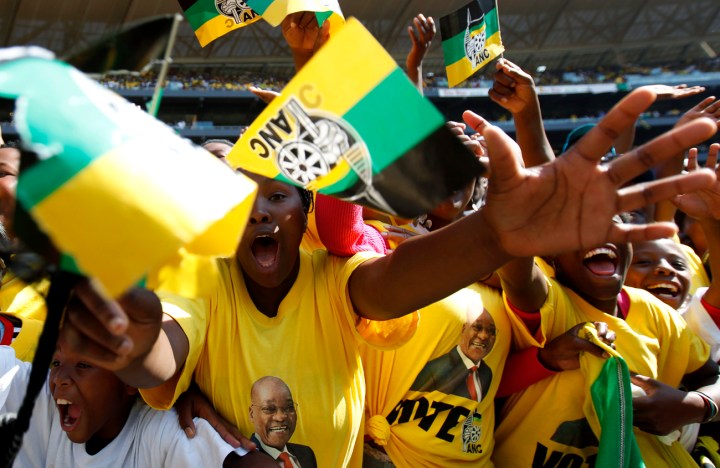Politics, South Africa
Analysis: A dress-up party, the ANC

Following the death of the former minister of co-operative governance and traditional affairs, Sicelo Shiceka, glowing tributes flowed, masking the disgrace in which he was immersed in the latter part of his life. RANJENI MUNUSAMY argues that this kind of obfuscation damages the ANC’s history and denigrates its proud succession of heroes.
In the year 2000, then president Thabo Mbeki delivered one of his most iconic speeches – second only to the legendary “I am an African” speech – at the funeral of the former ANC secretary-general, Alfred Nzo.
Nzo was the longest serving secretary-general of the party, having held the position from 1969 to 1991 and, together with its former president, Oliver Tambo, held the organisation together during the most difficult years of the liberation struggle.
Mbeki, then a year into his presidency, produced a touching and unforgettable oration, commemorating a giant of the liberation movement and the iconic generation of ANC heroes who had championed the fight for freedom and was now passing.
“Time has swallowed up our heroes and heroines.
Not anywhere in free South Africa stand a statue and a monument which speak to us and all future time to say – once upon a time, our country was blessed to have as its citizens these who, though dead, are brought to life by every day’s dawn that portends fulfilment for all the people of our motherland.
They too slide into the past as though they never were.”
Throughout the speech was the refrain: “Alfred Nzo lies in front of us in his small house of wood, cold and still and without a voice.”
The speech captured the deep emotion the ANC fosters to celebrate and remember a progression of heroic leaders but also, in Mbeki’s inimitable style, proclaimed the qualities that set Nzo apart from the rest.
“He showed us by example that we needed no high-sounding titles to discharge our obligation faithfully to serve the people of South Africa.
“While he lived, his humility, his self-effacing ways, his constant humour, his loyalty to principle, his avoidance of the self-serving theatrical flourish, his refusal to be defeated, the certainty his very being carried of the inevitability of the realisation of our hopes, brought light and joy to all our nights of despair.”
Of course, it wouldn’t be Mbeki if there wasn’t a stretch of poetic licence: “The gods themselves would lose their patience with us if we permitted that time should persuade us that this jewel on our crown has lost its sparkle, merely because the soil we tread will have taken into its bosom the small wooden house that Alfred Nzo now occupies.”
Though embroidered, the tribute was fitting and appropriate, as were those delivered at the passing of Tambo, Walter Sisulu, Govan Mbeki and other legendary leaders.
The ANC has always made a concerted attempt to ensure that its history and leaders were viewed as extraordinary – unlike any other on the continent or across the world.
However, that mission is being rubbished by its propensity to celebrate anyone who held any position of seniority in the organisation as a national hero and to try and expunge their misdeeds when they die.
As a 100-year-old organisation, the ANC has obviously produced thousands of courageous leaders who made painful sacrifices and immense contributions to the liberation struggle. These included those who left their homes and families to join Umkhonto we Sizwe (MK), the military wing of the ANC, and others who fled into exile to fight the apartheid machinery from foreign lands.
Thousands of others remained in the country, suffering detention and harassment while they organised defiance through the United Democratic Front and other structures of the mass movement. The legion of Robben Island political prisoners has a special place in South African history and that of the liberation organisations.
While the Truth and Reconciliation Commission gave an insight into the trauma and difficulties endured, many thousands of stories of sacrifice and human suffering remain untold. Fallen heroes remain unacknowledged and dozens of combatants are living despondent and unrewarded for their individual contributions and sacrifices.
Some people have, however, been able to rise to senior positions in the ANC and government after liberation, and some have distinguished themselves in public service. But not all who hold high office have been deserving of their positions in Cabinet and Parliament. Many have developed into career politicians, surviving through the strength of their constituencies or their proximity to other influential leaders.
A few of these leaders have brought dishonour to the ANC through woefully poor performance or abusing their positions for personal gain. The ANC has a tendency to close ranks when allegations of misconduct emerge against one of their own and rarely speaks out against failings of members of the executive.
In the event of death, scandals and misdeeds are expunged and never spoken of. “Special official” funerals hosted by the state are in abundance, and there have been cases where Cabinet ministers who are desperately ill and unable to perform their duties are retained in the executive until their deaths, merely to have a grand funeral.
Former defence minister Joe Modise, the first guerrilla commander of MK, died in 2001 as allegations of corruption in the arms deal were mounting. While Modise’s role in the negotiation of kickbacks as part of the deal has never been conclusively proven, the ANC has put up a pretence that nothing of the sort happened.
The most obvious example of revising history to mask the shame of the dead was the case of the former minister of health, Manto Tshabalala-Msimang, whose contrarian positions on HIV and Aids resulted in confusion in public policy and delays in the dispensing of much-needed antiretroviral treatment. Yet when she died, the ANC wished only to remember Tshabalala-Msimang’s noble early history and shouted down anyone who dared to raise her blundering legacy as health minister.
This week, former co-operative governance and traditional affairs minister Sicelo Shiceka died after a “long illness”. He was fired by President Jacob Zuma last year after overwhelming evidence of maladministration and violations of the executive ethics code were proven by the public protector.
Shiceka showed utter disdain for the protector’s investigation and, after his axing, failed to acknowledge or apologise for his blatant abuse of public funds.
This has set a bad precedent in the public service because the lack of recourse has meant that others who are merely released from their positions can also escape sanction or prosecution.
Next week, glowing tributes will flow at the funeral of the former minister, as has been the case when other disgraced ANC leaders have died. It is conventional not to speak ill of the dead and “un-African” to acknowledge their wrongdoings, but the ANC sometimes goes a step further to revise history (it will be fascinating to see what the ANC comes up with when Zimbabwean President Robert Mugabe finally meets his maker, however improbable it may seem).
Shiceka’s personal exploits with members of the opposite sex and circumstances around the severe beating he received, which left him scarred and unable to walk, are well known in the ANC, yet remain unspoken now. In all the tributes this week, there were only a few like Cosatu who dared to be honest about Shiceka’s “grave error” when he was a minister.
The effect of this practice of revising history is that it is now difficult to distinguish the true ANC heroes from the array of people who have been proclaimed heroes in death. On Thursday evening, the presidency announced that Shiceka would have a “special official funeral”, meaning he will have the same status in death as Walter Sisulu. To do this is to belittle the memory of Sisulu.
As the years go by and the memory of the liberation struggle recedes, history will group together all the ANC’s fallen leaders as heroes. Future generations may not be able to tell the difference between those who died as honourable and towering giants of their time from those, like Shiceka, who left their legacies in tatters. Respect for the dead is necessary, but so is the truth. DM
Photo: Unnecessary obfuscation damages the ANC’s history and denigrates its proud succession of heroes. REUTERS.





 Become an Insider
Become an Insider